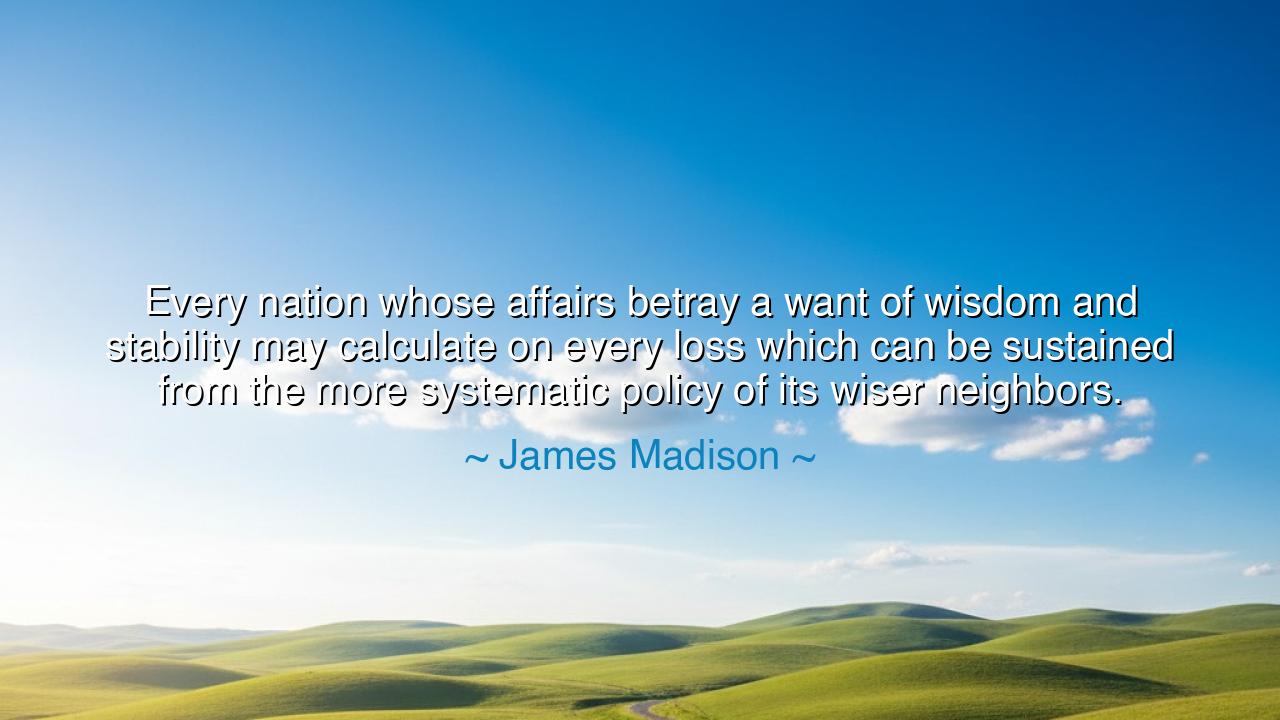
Every nation whose affairs betray a want of wisdom and stability
Every nation whose affairs betray a want of wisdom and stability may calculate on every loss which can be sustained from the more systematic policy of its wiser neighbors.






Listen well, O seekers of eternal counsel, to the warning imparted by James Madison, the sage of a young republic, who spoke of the delicate balance between wisdom, stability, and the fates of nations. He taught that a nation bereft of careful thought, whose affairs betray disorder or shortsightedness, invites the consequences of its own neglect. The eyes of history watch such lands, and the more systematic policy of wiser neighbors will inevitably reap advantages, leaving the heedless to endure loss upon loss. Here lies a lesson carved into the scrolls of time: prudence and foresight are the shields of a people, while folly and chaos are the keys to their undoing.
The origin of Madison’s words is rooted in the early years of the American Republic, when the fledgling United States sought to navigate a world dominated by seasoned powers. Europe’s monarchies and empires, with their intricate diplomatic networks and centuries of experience, contrasted starkly with the experimental governance of the new nation. Madison, a principal architect of the Constitution, perceived that stability and wisdom were not mere virtues but instruments of survival. Without careful design, a nation risks being swept aside by the calculated and measured strategies of its neighbors.
The meaning of this admonition stretches beyond the councils of statesmen into the hearts of all who wield authority. It reminds us that heedlessness carries tangible consequences, and that the fate of a nation is intertwined with its capacity for rational governance, forethought, and systematic planning. A people divided by shortsightedness, impulsive action, or corruption will inevitably suffer the losses that stem from external pressures, and the victories of others. True wisdom, therefore, is the vigilant preparation of one’s own house before casting judgment upon the world.
History offers us living testimony of Madison’s insight. Consider the fate of Poland in the 18th century, whose internal disunity and weak political structures invited the systematic intervention of its stronger neighbors: Russia, Prussia, and Austria. Time and again, Poland’s lack of stability and coherent policy rendered it vulnerable, culminating in the partitions that erased its sovereignty for over a century. Here, the lesson is etched in sorrow: nations that neglect wisdom and order invite calamity from those whose plans are sound and deliberate.
O children of the future, let this teaching penetrate your hearts: the affairs of a nation are not governed by chance but by the measured hand of prudence. The wise architect of statecraft considers both internal harmony and external pressures, recognizing that neglect and disorder are invitations to loss. By cultivating stability, foresight, and systematic planning, a nation secures its legacy, and ensures that the labors of its people are preserved against the tides of ambition and conquest.
Thus, let Madison’s words endure as a lantern upon the path of generations: a people who honor wisdom and stability may flourish, while those who forsake them invite the inexorable losses born of others’ measured and systematic policies. Learn, therefore, O sons and daughters of history, to govern with thought and virtue, lest the folly of inattention become the undoing of all.






NTDieu Huyen Nguyen Thi
Reading this, I feel a sense of realism tinged with concern. It suggests that naivety or disorganization can be costly on the international stage. Does this principle still hold in the modern world of multinational institutions, treaties, and global norms, or have diplomatic frameworks mitigated such risks? I also wonder how a nation can cultivate the necessary wisdom and stability to avoid these losses without becoming rigid or overcautious, potentially stifling innovation and adaptability.
TTVan Anh Tran Thi
This perspective provokes reflection on the relationship between stability and international influence. If nations without consistent policies are more prone to losses, does this justify intervention by stronger neighbors, or does it merely highlight a natural consequence of disorganization? I’m curious whether Madison’s insight is primarily a caution to domestic policymakers or a broader lesson for global relations. How might countries today balance internal reform with external pressures to maintain sovereignty and minimize losses?
MVDuong Minh Vu
I feel both cautious and curious reading this. It implies that systemic wisdom is a key determinant of national survival and success. Does this mean that even morally upright nations can suffer if they fail to act strategically? I also question how smaller nations or those with limited resources can compete against more systematic powers. Is resilience dependent solely on internal governance, or do alliances and diplomacy provide meaningful protection against external losses?
NQLe Thi Nhu Quynh
This quote makes me reflect on the importance of governance and strategic planning. It seems to suggest that nations lacking foresight or stability are vulnerable to exploitation by more organized and prudent neighbors. I wonder how this principle applies today with global economic competition, cyber warfare, and geopolitical maneuvering. Can modern nations truly insulate themselves from losses if their policies are inconsistent, or is vulnerability inevitable without careful planning and wise leadership?